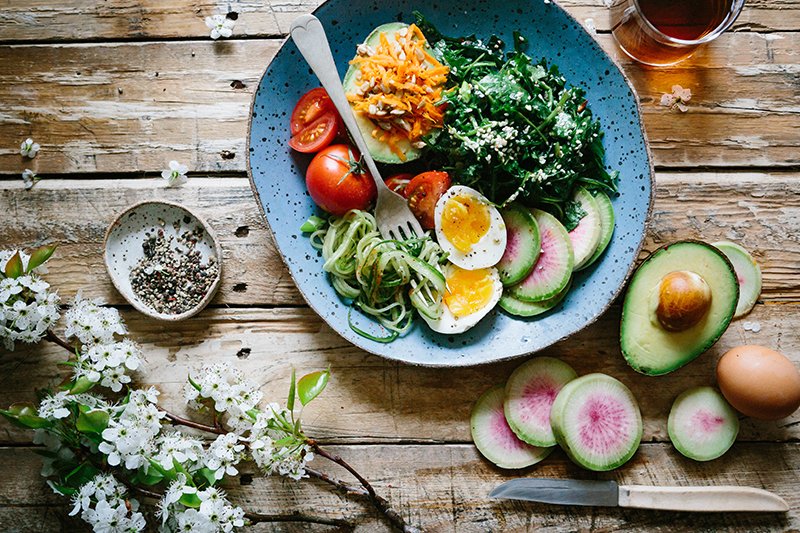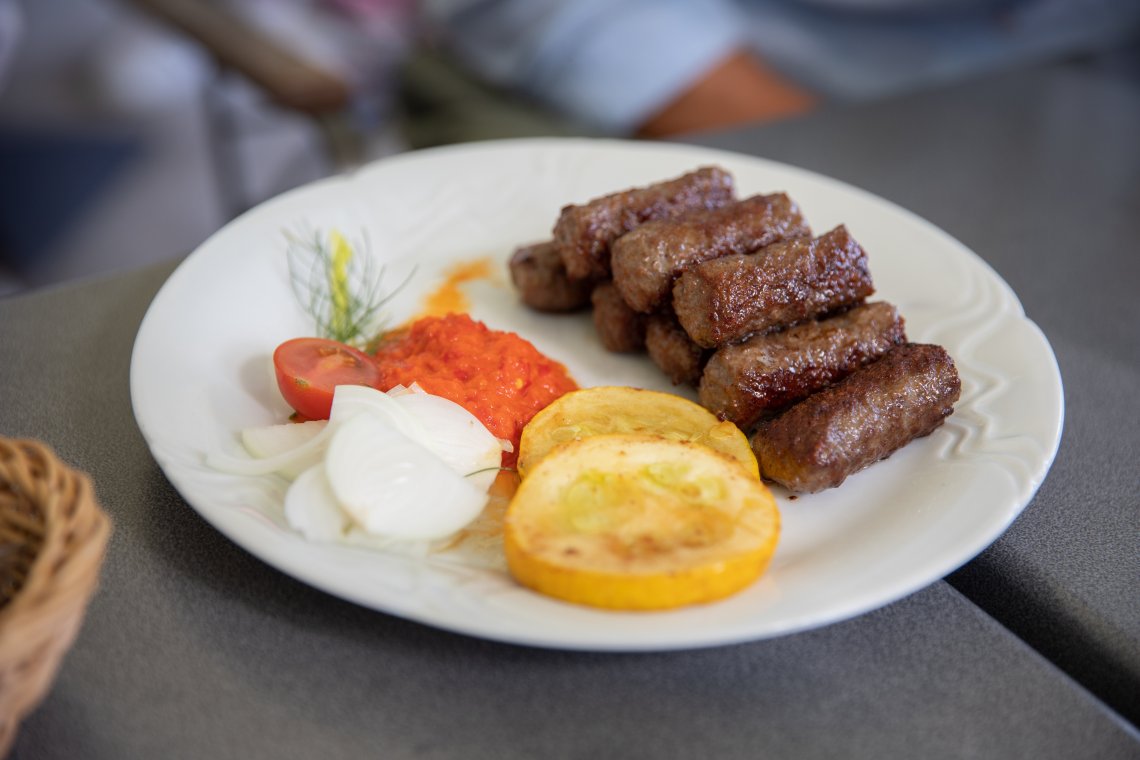Authors: Amina Hodžić, Sarah Huseinović, Laura-Marie Godel , Anes Hrnjić
When one of our journalists, Laura Godel from Switzerland, visited Bosnia and Herzegovina, she quickly noticed some striking cultural differences - in vegetarianism.
Not only did she find the way in which Swiss and Bosnian people view vegetarianism differently , but she also discovered different culinary options, which are available as a result of this divergence.
This became especially apparent to Laura, when she ate at Bosnian restaurants - which had very few vegetarian options available.
That was the point where the Swiss-Bosnian group decided to get to the bottom of this and to uncover how people perceive vegetarianism differently in the two countries.
According to the association Swissveg, in Switzerland round 300’000 people are vegetarians, which equates to 5 percent of the country’s population, while around 0.6 percent are vegan. And the numbers keep growing, according to Swissveg’s homepage.
This suggests that vegetarianism is a relatively popular lifestyle and that overall it is rather accepted within Swiss society.
Vegetarians and vegans: Who is who?
-A vegetarian is a person who does not eat any meat or fish for various reasons including ethical, religious, health-related, environmental or simply personal reasons.
-A vegan is a person who does not eat anything that is derived from animals. For example they do not eat dairy or egg products, nor do they eat honey and some also choose to renounce any clothing derived from animals including fur or leather clothing.
In Bosnia and Herzegovina, however, being vegetarian is not as popular as it is in Switzerland, and what we found in our research, on the former, was unexpected. The situation is so bad that it is hard to find any reliable information regarding exact numbers of vegetarians, let alone vegans, in Bosnia and Herzegovina.
While vegetarian restaurants in Switzerland are very popular and one can find many recommendations, in Bosnia and Herzegovina, according to the city guide website “inyourpocket” there are only four in the entire country. The online blog “veganary” recommends that vegans bring their own snacks and food if they plan on going to Bosnia’s capital Sarajevo.
To find out more about personal experiences with vegetarianism, we interviewed people both from Switzerland and Bosnia and Herzegovina. Among them are our project participants Laura Godel, a young woman from Switzerland, and Mumi Terzić, a young Bosnian, whom we interviewed more thoroughly. We then set out to the streets of Zenica to get some public opinions and later asked Bosnian and Swiss people from our writing group for their inputs on the issue.
Interview
Why did you decide to become a vegetarian and how long have you been a vegetarian for?
Laura Godel: I decided to become a vegetarian about 8 years ago when I was 13 years old. In a sports camp I signed up as a vegetarian just to try it out and then decided to stick with it. Then I started watching videos on Youtube about the meat industry and the often brutal realities of meat production. This further convinced me to continue my vegetarian diet. Later I learned more about the environmental impact that the meat industry has which I see as another good argument for reducing meat or even completely cutting it out of my diet.
Mumi Terzić: I've been a vegetarian for almost 3 years now. After watching several documentaries regarding vegetarian lifestyle and having a few vegetarian friends, I decided to try it out myself. The argument of this lifestyle being more sustainable and contributing to a better environment was a no brainer for me.
How did your family accept this lifestyle?
LG: My family was very accepting and understanding of my decision. There was mostly curiosity regarding my choice and the topic in general. My mother started cooking more vegetarian meals and even started eating less meat herself. Now, a few years later, she also has a mainly vegetarian diet like me. It’s nice to see that even though I didn't expect anything, my personal choices have had a positive impact on my surroundings.
MT: At first, my family was shocked that I decided to not eat meat. Coming from a culture where meat makes up a big part of the cuisine, it was really weird for them. Generally, they all accepted it in the end and my mom even started preparing Bosnian dishes for me without certain key meat ingredients, just to contribute to the whole cause.
What is your experience in restaurants and supermarkets in Switzerland/ in Bosnia as a vegetarian?
LG: Since I’ve been a vegetarian now for some years I’ve seen the evolution of restaurants as well as supermarkets regarding vegetarian options in Switzerland. When I first started there were some options in the supermarket and in restaurants but they were very limited. In recent years I’ve seen more and more good vegetarian meat substitutes as well as some more vegan options in supermarkets. Restaurants, as well, have more options which is nice because then there’s not just the one salad or vegetarian pizza to choose from but you usually have the possibility to order a meal that you actually enjoy.
MT: Vegan and vegetarian menus in Bosnian restaurants consist mostly of salads that are always a part of the menu. There are a few vegan and vegetarian restaurants, but mostly in the bigger cities, and they are quite expensive. The choice of food is limited to the same few products and most of them are much more expensive than, say, "normal" food.
In general, how does your society accept the vegetarian lifestyle?
LG: As well as with food options, the societal perception of vegetarianism has developed even in the last few years. I think with people my age, it generally wasn’t a big issue even 8 years ago but now the older generation is slowly getting used to the idea as well. My grandparents, for example, had some curiosity and questions about my choice but they have been very considerate and accepting of it too.
MT: Most of our society doesn't really know what it means to be a vegetarian. The impact of being vegan/vegetarian relates to being more aware of your surroundings, the environment in general, helping in the contribution of a more sustainable life for everyone on the planet.
Sometimes it feels like the influence of our lifestyle is not great enough, because of the small number of people who accept such a way of life. Our Bosnian economy itself may not have as much of an impact as some larger, more developed countries. However, there are some clear benefits that I've noticed, for example on my health and direct surroundings. Many people are not aware that their small contribution can have a big impact on life in general. Furthermore, maybe slowly there will be a larger awareness in our culture that it might be easier than it seems to develop such a lifestyle.
Street Interviews
In our surveys with Bosnian and Swiss people, a variety of opinions regarding vegetarian lifestyle became apparent.
Some Bosnians couldn't imagine life without meat and one person even said that God created animals so they can be eaten and used.
Others respect that lifestyle but they couldn't imagine living that way themselves because meat is an important part of their culture and it is also expensive to be a vegetarian in Bosnia and Herzegovina.
Swiss people on the other hand told us that, in some social circles and especially in universities, you could even be judged for eating meat. However, a couple of Swiss people said they couldn't imagine adapting this lifestyle themselves either.
Final note
Overall we hope our readers could gain a deeper understanding for what it truly means to be a vegetarian in both Swiss and Bosnian culture including the difficulties and rewards of the lifestyle. So our final message, on a very personal note, is: Make tofu (and burek) not war!
Editors: Andy Barron, Aleksandra Hiltmann
Article series “Youth Voice: We can!”
This article was written by participants of the project “Youth Voice: We can!”. The media literacy and intercultural exchange project was organized by the Swiss-Bosnian diaspora platform “i-diaspora” from Switzerland and the Association for Care and General Rights of Children “Our Children” from Zenica. The 15 participants from Switzerland and Bosnia and Herzegovina met in Zenica from 25th to 31th of August 2022, took part in journalism workshops and created their own radio show “Burek and Fondue” which was aired in the program of Zenica’s community radio station RadYo Active Zenica.
Sources:
Photo Source (Header): Brooke Lark (Unsplash)
Photo Source (text): Media Lens King (Pexels)


